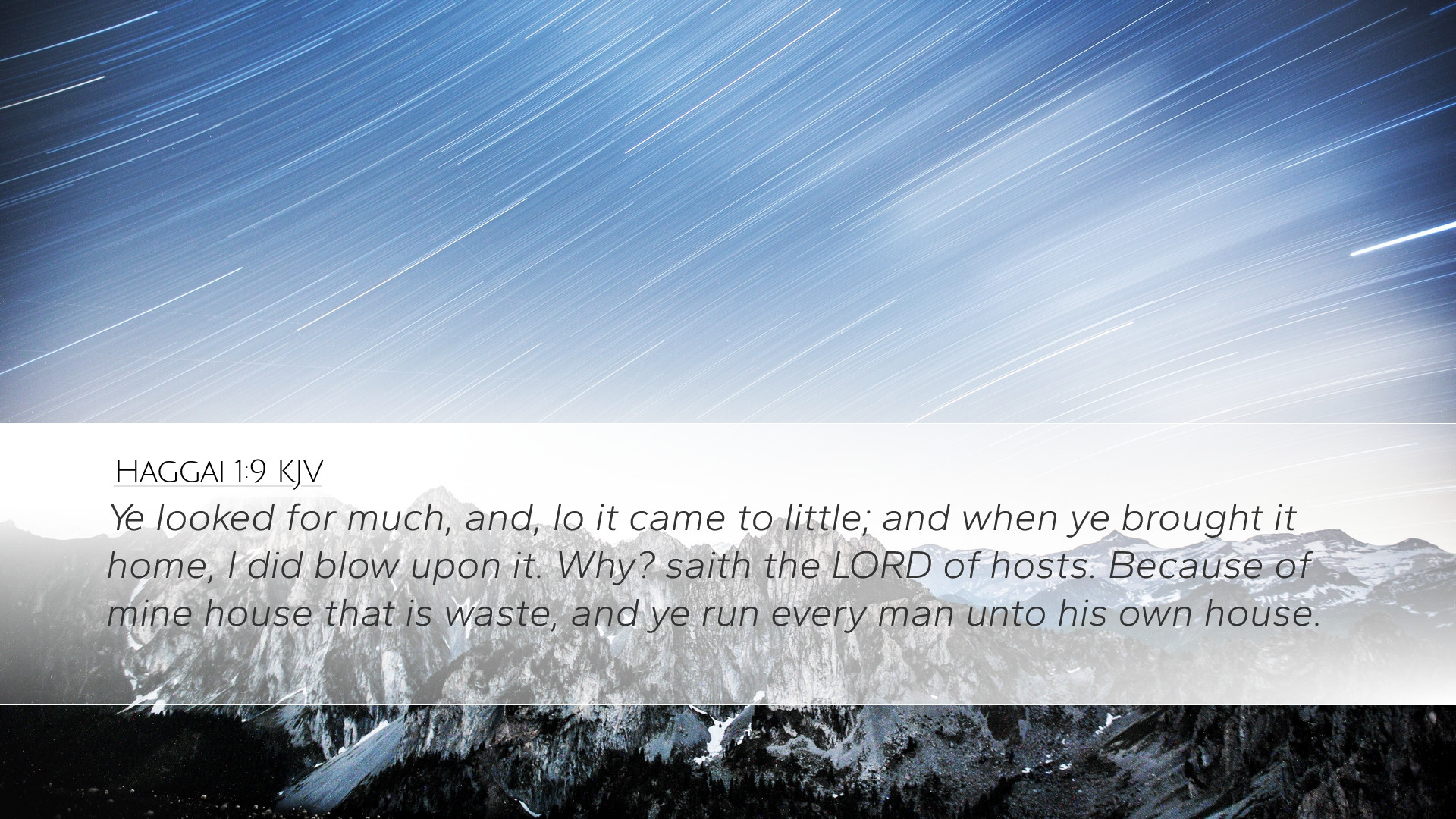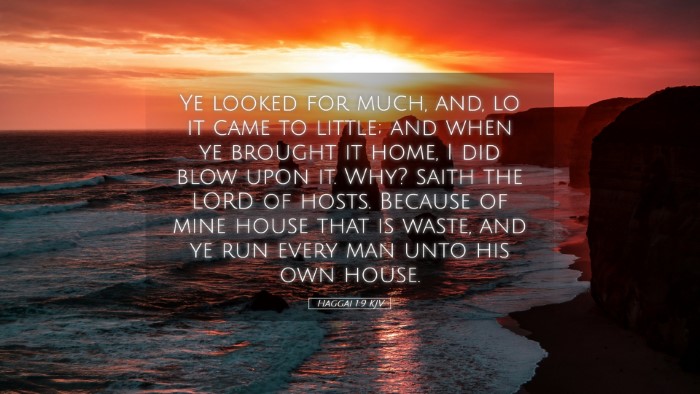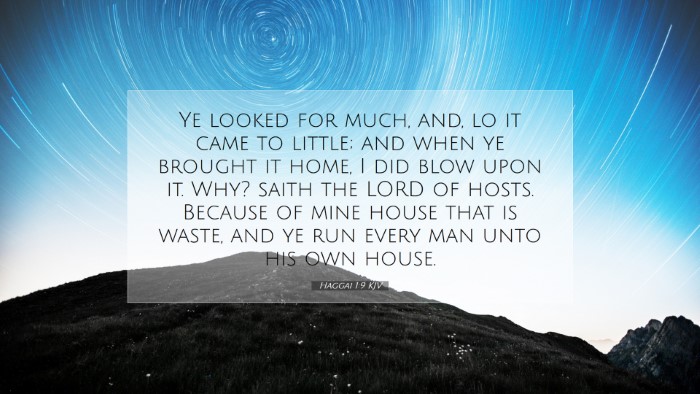Old Testament
Genesis Exodus Leviticus Numbers Deuteronomy Joshua Judges Ruth 1 Samuel 2 Samuel 1 Kings 2 Kings 1 Chronicles 2 Chronicles Ezra Nehemiah Esther Job Psalms Proverbs Ecclesiastes Song of Solomon Isaiah Jeremiah Lamentations Ezekiel Daniel Hosea Joel Amos Obadiah Jonah Micah Nahum Habakkuk Zephaniah Haggai Zechariah MalachiHaggai 1:9
Haggai 1:9 KJV
Ye looked for much, and, lo it came to little; and when ye brought it home, I did blow upon it. Why? saith the LORD of hosts. Because of mine house that is waste, and ye run every man unto his own house.
Haggai 1:9 Bible Commentary
Commentary on Haggai 1:9
Haggai 1:9 states: "You looked for much, and, lo, it came to little; and when ye brought it home, I did blow upon it. Why? saith the Lord of hosts. Because of mine house that is waste, and ye run every man unto his own house." This verse serves as a poignant reminder of the consequences of neglecting the responsibilities God has given, particularly in relation to His Temple and the prioritization of personal affairs over divine mandates. Below is a synthesis of insights from various public domain commentaries.
Contextual Background
The Book of Haggai is a prophetic text delivered during the post-exilic period, addressing the people of Judah who returned from Babylonian captivity. The backdrop of this prophecy is a community that has become comfortable in their own homes while the Temple of the Lord lies in ruins. Haggai's urgent message confronts them about their misplaced priorities.
Overview of the Verse
-
Examination of Efforts:
Haggai states, "You looked for much", indicating the people's anticipation for abundant blessings. However, the reality was starkly different: "and, lo, it came to little". This phrase illustrates the futility of their labor when God's will is overlooked.
-
Divine Intervention:
The phrase "I did blow upon it" symbolizes God's active role in diminishing their efforts. As they sought to prosper materially—a common pursuit—the Lord confronted them with a spiritual truth: their focus on personal gain while neglecting His house resulted in divine disfavor.
-
Challenge of Priorities:
In the verse, God articulates a clear question: "Why?" This inquiry emphasizes the absurdity of their situation; the people are committing themselves to their own houses while neglecting the house of God. This serves as a theological and moral challenge to their priorities.
Thematic Insights
Several themes emerge from Haggai 1:9 that resonate profoundly with church leaders and theologians:
-
Materialism versus Spirituality:
The juxtaposition of seeking much versus receiving little underscores the spiritual bankruptcy that accompanies materialistic ambitions. When wealth is prioritized over worship, the resulting emptiness is both personal and communal.
-
God's Sovereignty:
God’s sovereignty is further illustrated in His control over both the blessings and the curses experienced by His people. The sense of divine displeasure should urge believers toward self-reflection on their commitment to God's mission.
-
Call to Action:
This verse acts as a prophetic call for action—it demands that the people reconsider their priorities, bring back their focus on God's house, and understand that their well-being is intricately bound to their relationship with Him.
Commentary Insights
According to the insights provided by Matthew Henry, the neglect in rebuilding the Temple illustrates a broader spiritual neglect. Henry emphasizes that God’s house should be prioritized as it represents His presence among His people. If the Temple is in disrepair, it signifies a larger issue of spiritual neglect and apathy.
Albert Barnes elaborates on the implications of "I did blow upon it," suggesting this reflects God's providence, which redirects the paths of those who stray from His command. Barnes draws attention to the relationship between human actions and divine response, pointing out that self-centered living results in a lack of fulfillment.
Adam Clarke emphasizes the historical and cultural backdrop, explaining that in the context of their return from exile, the people were enticed by comfort and self-interest. Clarke’s interpretation highlights the importance of placing God first, asserting that neglecting His requirements leads to spiritual poverty.
Applications for Today's Church
Haggai 1:9 captures timeless truths that remain relevant for contemporary congregations:
-
Encouragement to Evaluate Priorities:
Believers today are called to examine where they may be prioritizing personal interests over communal worship and service. This encompasses both time and resources, urging a reevaluation of how these are allocated.
-
Recognition of God’s Discipline:
The passage serves as a prompt for church leaders to recognize that God’s discipline may manifest when His house and His purposes are overlooked, urging a return to a God-centered focus.
-
Call for Restoration:
The message of Haggai is not solely one of reproach but also one of hope. There is an invitation for renewal and rebuilding—not just physically in terms of church buildings but spiritually in the hearts of believers.
Conclusion
In conclusion, Haggai 1:9 gives a profound insight into God's relational dynamics with His people regarding their priorities. By reflecting on the lessons drawn from historical commentaries and applying them to contemporary life, pastors, students, and theologians are reminded of the eternal truth that when God's house is neglected, spiritual barrenness follows. It calls forth a holistic approach to faith that places devotion and service at the forefront of every believer's life.


